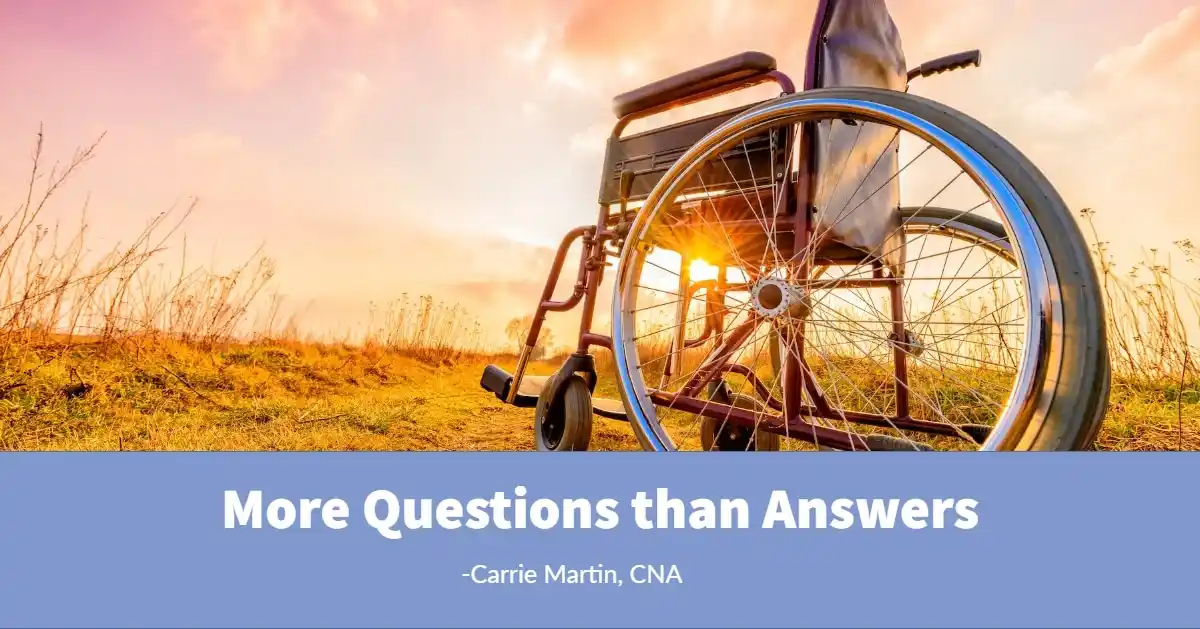More Questions than Answers
What am I doing here? This is overwhelming and a little unsettling, this opportunity as a visiting hospice CNA. Do I have what it takes to care for people in this capacity? Am I strong enough? What is the right way to do this? How do others do it? Is this about the company? The facility? My own beliefs? The patient? Who do I aim to please? I am expected to assist twelve people in less than twelve hours every day, making lifelong connections along the way – although their lives are coming to a close. Daily I am faced with my own mortality.
How will I behave in my “golden years”? Will I be the quiet, observant person I have always been? Or will I be the one in so much pain that I will curse and yell and lash out? Will I be so confused because of dementia that I will come across as rude when, inside, that isn’t what I meant at all? What kind of care? Will my children avoid me because I’m not the mama they remember? Or will they visit often, knowing somewhere deep inside I recognize them, although I have no way of telling them so?
“What will be my purpose in those final years?”
What will be my purpose in those final years? I will be unable to give of myself and help others, which is what gives my life significance. Others must care for me. And from the looks of things, they may not all be patient, understanding or gentle, or spend any extra time with me, or allow me to do the things I enjoy, like sit me by an open window or take me outside. They may not be willing to read with me, let me hold and pet animals, or sing with me.
When we met, you could make eye contact; carry on a conversation; walk a little; and even play the piano with two hands. You were dying from what my mama died from. I watched you both slowly suffocate, as the holes in your lungs made it a frightening and painful struggle to breathe.
“You sighed more. Your steps were shorter and less deliberate.”
As the days passed, you declined in tiny ways at first, possibly not even apparent to others. But I noticed. You sighed more. Your steps were shorter and less deliberate. It wasn’t long before you used the wheelchair more often. You had more trouble finding words to express yourself, though you would continue to tell me how grateful you were for my gentle touch and patience to go slowly with you, at your pace. You loved being pampered and treated like a queen. You would ask me how in the world I learned to treat someone so well and kindly, and with such dignity. You appreciated the lengths I would go to keep private things private. As your eyesight began fading, you would still light up at the sound of my voice when I greeted you each day.
Then you played the piano with only one hand. Then you played your last song. You started eating less. You stopped getting out of bed. Then you could only whisper a few words in response to me with your eyes closed. Then you never opened your eyes again.
How do I come to terms with this? How can I accept this after we connected so deeply and tenderly? You were a part of my life every day for so long! Now you’re suddenly gone. I am expected to continue with my day and strive to keep my composure when I am aching with your loss. No time to grieve in the moment of necessity. As I turn your still-warm body over to prepare you for your family’s final visit, I am struck by the permanence of it all. That was it. I had been witness to a kind of a reverse-newborn process, as you lost, rather than gained, the abilities to walk, control bodily functions, emotions, and speech.
The following day I see your chart still in the office. Now you are just a chart. Now you are just a name. Now you are just a memory. You are a memory that I will carry with me, fondly remembering your genuine appreciation and your encouraging words that uplifted me, and lighted my way to the next soul who was beginning their journey to the end.
“You are a memory that I will carry with me…”
Sold Out hospice stories on our hospice blog
Please feel free to contact us with any questions regarding hospice care


